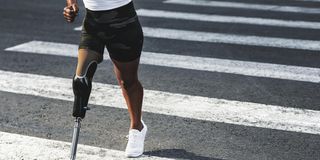Health experts call for urgent action to meet rising demand for prosthetic limbs

High demand for these devices attributed to an increase in the number of amputations caused by chronic health conditions such as diabetes, vascular disease and accidents resulting from road, work and sports injuries.
What you need to know:
- According to NTSA, 7,114 accidents were reported from the beginning of the year to August, resulting in 3,674 serious injuries, some of which may have resulted in amputations.
Health experts have called on the government to improve the accessibility and affordability of prosthetic limbs to meet the growing demand and prevent long-term disability for thousands of people in need.
Mr Peter Ongubo, a specialist in prosthetics and orthotics at Gateway Prosthetics and Orthotics Limited, pointed out that accident victims in need of limb amputations are often left to fend for themselves, with some resorting to using rods due to the high cost of acquiring prostheses.
A prosthesis is an artificial device or part of the body designed to replace or enhance the function of a missing or impaired natural body part. These devices are typically used by people who have experienced limb loss or deficiency, whether due to congenital conditions, accidents, medical conditions or amputation.
Mr Ongubo attributed the high demand for these devices to an increase in the number of amputations caused by chronic health conditions such as diabetes, vascular disease and accidents resulting from road, work and sports injuries.
"The introduction of motorcycles in 2009/2010 led to an increase in the number of amputees. Making prosthetics affordable is a step towards reducing health inequalities and ensuring that the most vulnerable populations have access to essential medical equipment. Proper prosthetic care reduces the need for additional medical interventions such as ongoing physical therapy or treatment of secondary complications such as pressure ulcers, muscle wasting and joint problems caused by improper mobility," said Mr Ongubo.
According to the National Transport and Safety Authority (NTSA), 7,114 accidents were reported from the beginning of the year to August, resulting in 3,674 serious injuries, some of which may have resulted in amputations.
Mr Ongubo noted that the Ministry of Health has not included prosthetic devices in the benefits package of the social health insurance scheme despite public participation. This, he said, will continue to make the treatment process challenging as prostheses are expensive and mostly imported, resulting in longer hospital stays, multiple admissions and increased risk of complications for patients.
"Prosthetic limbs can be expensive, especially advanced models with better functionality. Many people, especially those in low-income households, cannot afford them, leaving amputees without the mobility aids they need. Affordable prostheses would reduce the financial burden on families and allow more people to regain their independence," said Mr Ongubo.
He stressed that amputees who have access to prostheses can lead more fulfilling lives, participate in the workforce and maintain social connections.
"Lack of access to affordable prosthetics can lead to isolation, unemployment and poorer mental and physical health. Government support would improve the overall well-being and inclusion of those affected," he said.
Mr Ongubo, who also assembles and sells some of the prosthetic legs, said the cost depends on the type of foot.
"In Kenya, well-fitting and durable prosthetics are rare - prosthetics are myriad, they are like cars. There are different types and different prices. There is a basic foot, which is below the knee and costs about Sh50,000, and above that the price starts at Sh90,000. A carbon foot costs about Sh400,000 while an electronic foot can go up to Sh1 million because it is more like a human foot and is easy to use. Electronically powered joints can be recharged, which makes the cost different because of the different functionality," said Mr Ongubo.
In Kenya, only 22 per cent of amputees receive prosthetic limbs, highlighting a significant gap in care.
The World Health Organization (WHO) estimates that 30 million people need prosthetics and orthotics globally.
According to the WHO, more than 75 per cent of developing countries have no training programme for prosthetics and orthotics. The global health body also predicts that the number of diabetics worldwide will reach 642 million by 2040, which could lead to an increase in amputations.





